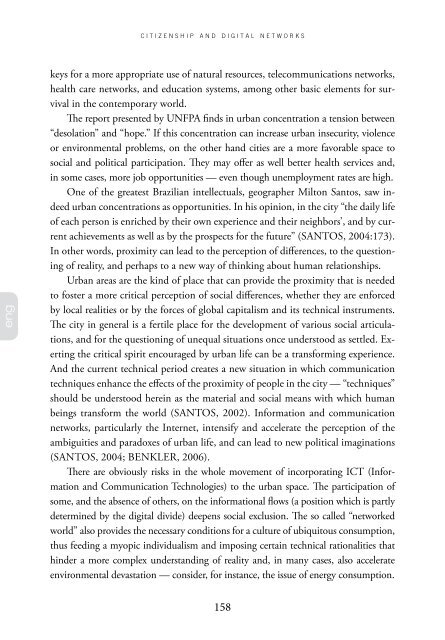Sergio Amadeu da Silveira - Cidadania e Redes Digitais
Sergio Amadeu da Silveira - Cidadania e Redes Digitais
Sergio Amadeu da Silveira - Cidadania e Redes Digitais
Create successful ePaper yourself
Turn your PDF publications into a flip-book with our unique Google optimized e-Paper software.
eng<br />
c i t i z e n s h i p a n d d i g i t a l n e t w o r k s<br />
keys for a more appropriate use of natural resources, telecommunications networks,<br />
health care networks, and education systems, among other basic elements for survival<br />
in the contemporary world.<br />
The report presented by UNFPA finds in urban concentration a tension between<br />
“desolation” and “hope.” If this concentration can increase urban insecurity, violence<br />
or environmental problems, on the other hand cities are a more favorable space to<br />
social and political participation. They may offer as well better health services and,<br />
in some cases, more job opportunities — even though unemployment rates are high.<br />
One of the greatest Brazilian intellectuals, geographer Milton Santos, saw indeed<br />
urban concentrations as opportunities. In his opinion, in the city “the <strong>da</strong>ily life<br />
of each person is enriched by their own experience and their neighbors’, and by current<br />
achievements as well as by the prospects for the future” (SANTOS, 2004:173).<br />
In other words, proximity can lead to the perception of differences, to the questioning<br />
of reality, and perhaps to a new way of thinking about human relationships.<br />
Urban areas are the kind of place that can provide the proximity that is needed<br />
to foster a more critical perception of social differences, whether they are enforced<br />
by local realities or by the forces of global capitalism and its technical instruments.<br />
The city in general is a fertile place for the development of various social articulations,<br />
and for the questioning of unequal situations once understood as settled. Exerting<br />
the critical spirit encouraged by urban life can be a transforming experience.<br />
And the current technical period creates a new situation in which communication<br />
techniques enhance the effects of the proximity of people in the city — “techniques”<br />
should be understood herein as the material and social means with which human<br />
beings transform the world (SANTOS, 2002). Information and communication<br />
networks, particularly the Internet, intensify and accelerate the perception of the<br />
ambiguities and paradoxes of urban life, and can lead to new political imaginations<br />
(SANTOS, 2004; BENKLER, 2006).<br />
There are obviously risks in the whole movement of incorporating ICT (Information<br />
and Communication Technologies) to the urban space. The participation of<br />
some, and the absence of others, on the informational flows (a position which is partly<br />
determined by the digital divide) deepens social exclusion. The so called “networked<br />
world” also provides the necessary conditions for a culture of ubiquitous consumption,<br />
thus feeding a myopic individualism and imposing certain technical rationalities that<br />
hinder a more complex understanding of reality and, in many cases, also accelerate<br />
environmental devastation — consider, for instance, the issue of energy consumption.<br />
158


